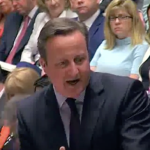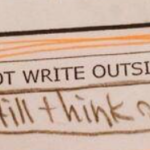These are confusing times for educators. Two weeks ago I arranged for the UK premiere of a much-debated film about the kinds of schools we need for the future, ‘Most Likely To Succeed’. The film argues that the skills our kids will need in a highly automated, freelance/contracted, future workforce, can’t be developed through a standardised drilling-and-killing model of teaching and learning. We had a good mix of educators and concerned parents in the audience, and the discussion afterwards largely revolved around the knowledge-skills tension: corporates increasingly seem to demand higher-order skills, but schools are being pressured into training students in test-taking. And are the two mutually exclusive?
Coming on the back of the recently published Education White Paper in England, there seems to be a fierce protest from educators about the direction of travel (forced academisation, increased testing, diminution of parental representation on governing bodies), yet relative quiet from parents themselves. Is this because they’re generally content and don’t see education as a key issue, or are the issues simply too confusing?
Some critics of the government have seen the compulsory centralising of schools, directly under DoE supervision, as a Stalinist ploy, while others have seen it as the ‘pre-privatisation’ stage in a bigger neoliberal conspiracy. Others are determined to see the positives. Alistair Falk, Director of Partnerships at Birmingham Education Partnership, in a recent post, urges us all to see the prospect of every school being part of a Multi-Academy Trust (for that is what’s being proposed, not all schools becoming academies, but all becoming part of a MAT) as an opportunity: no more national curriculum constraints, no more local authority control, a chance to re-design schooling.
Like I say, it’s all a bit confusing. One thing seems certain: these steps aren’t being taken because there’s overwhelming evidence that the ‘free-marketisation’ of schooling provides better outcomes, because that clear-cut evidence (the kind that would warrant such a drastic move) just isn’t there. Indeed, Laura McInerney (@miss_mcinerney) recently reported on a damming study on 160 forced academies (forced, because they were deemed to be ‘failing’). 21 of them brought in so-called ‘super-heads’ to turn around exam results. The super-heads followed a by-now familiar strategy: focus absolutely on English and Maths; kick out badly-behaving students; move great teachers to work with year 11 (exam year) students; don’t enter low-ability students in exams, or persuade parents to home-school them. The longer-term results show a striking consistency: a short-term improvement in test scores of around 9%, but once the super-head had left, a 6-9% dip in scores. Schools without super-heads showed, in general, only incremental improvement, but no dip.
The super-head strategy is more or less what we see with corporations whose profits fall: a ‘fixer’ CEO is brought-in to satisfy shareholder anxiety; if he (because it’s nearly always a he) succeeds then he gets lured away to a better paid position, and the cycle starts all over again.
Except schools aren’t businesses and they don’t have shareholders – yet.
Let me make my position clear. I don’t believe that having an ideological position on education is helpful to the prospects of our kids. I’ve had Twitter maulings for saying that I thought that an aim of the government instigated ‘free schools’ – to bring diversity and innovation to school models – was laudable. But, increasingly, I feel that the reforms of the past 3 years are not based on ‘what works’, but on an ideology of neoliberalisation. There are two classic strategies of neoliberalists: never let a good crisis go to waste, and exercise ‘creative destruction’, so that the former system can never be revived. For the former, you only have to read Naomi Klein’s ‘The Shock Doctrine’ to see that the economic crisis provided the perfect excuse (via austerity cuts to public services), to remove local accountability for schools. As for ‘creative destruction’ – well, if the current government collapsed overnight, it would take decades to restore a more democratic framework for schools, if even possible. So, that’s two boxes ticked.
Neoliberalism advocates privatisation, deregulation, competition and a ‘free market’, which begs two questions: will we soon have a free market for schools, and does any of this matter, anyway?
It maybe wouldn’t be such a bad thing if there really was a free market for schools – defined by each school having an equal chance, and equal funding. But the initial aim of free schools appears to have been distorted by government ideology: Laura Mcinnerney again (boy, has she been busy lately…) has fought a one-woman battle to have transparency over why some free schools have been approved while others were rejected. This post highlights a very disturbing opacity.
And does it matter, so long as standards and test scores improve? Well, setting aside the recent doubt of the schools inspector, that multi-academy trusts performed no better than the worst performing local authorities they were meant to replace, yes it does. The neoliberal bit that seems to be missing in current education policy is the ‘laissez-faire’ part. The schools minister, Nick Gibb, has made his views clear – in total opposition to the arguments made in ‘Most Likely To Succeed’, he wants to see traditional teaching of facts to replace ‘joyless skills’. So, we can expect to see MATs (who will be directly monitored by the Department for Education, remember) being coerced into changing their teaching. Leaders of schools advocating ‘progressive’ teaching – many of whom lead schools judged as ‘outstanding’ are already being personally abused on social media, and some have even had their families threatened.
So, whatever the declared intentions of structural reforms, there’s no question that it’s bound to have an effect on teaching and learning – and will be driven by a testing obsession which benefits no one but the profits of education businesses.
I’ll end with the two questions which were left hanging at the showing of ‘Most Likely’ and ask you for your views: Is the Education White Paper primarily an attempt to remove democratic accountability from schooling by privatising it (the neoliberal conspiracy)? And if parents oppose the future plans what can they do about it?




